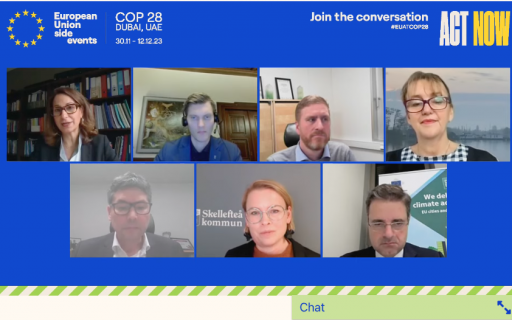Participating in a COP28 side event organized by the European Commission, the Amsterdam Region delved into Local Green Deals as instrument for achieving the green transition. The primary goal for the session was to uncover actionable strategies and prerequisites essential for fostering public-private collaboration to realize the sustainability transition. Marja Ruigrok, vice-mayor for the municipality of Haarlemmermeer, represented the Amsterdam Region alongside political and business leaders from Braga (Portugal), Aalborg (Denmark) and Skelleftea (Sweden).
Commencing the session, Valentina Superti, DG for Internal Market, Industry, Entrepreneurship, and SMEs at the European Commission, highlighted Europe's ambition to become the first climate-neutral continent by 2050. This necessitates a transformative shift towards sustainability, digitalization, and resilience, which is why the Commission is introducing critical legislation like the Net-Zero Industry Act and the Critical Raw Materials Act.
Ruigrok shared insights from the Amsterdam Metropolitan Region’s efforts in establishing Local Green Deals, emphasizing her role as political ambassador and champion for the Green Deal Bikes initiative. She stressed the importance of cycling, explaining that despite its reputation as a cycling paradise, approximately 20% of young people in the Amsterdam Region can not ride a bike: “If you don’t learn to ride a bike at a young age, you are also much less likely to use a bike for commuting later in life. That’s why in this Green Deal, we stimulate young people to learn to ride bikes, and encourage employers to support commuting by bike. This is crucial because employees who bike take on average 2.5 fewer sick days compared to those who don’t bike.”
Reflecting on success factors, Ruigrok emphasized the need for political commitment, and clear project ownership: "From a political point of view, you need long term commitment, and you have to create ownership. Someone has to take ownership and say ‘this is my project.’ This might be a governmental agency, a company, a knowledge institution, or civil society organisation - but someone has to take the lead. Otherwise, you will continue to talk, and nothing will happen."
Throughout the session, participants provided practical insights and recommendations for fostering successful public-private collaborations in general, and Local Green Deals in specific:
- Lasse Frimand Jensen, mayor of the City of Aalborg, emphasized the necessity of accountability mechanisms: “Mutual commitment is necessary and there must be mechanisms in place to keep each other accountable.”
- Ricardo Rio, mayor of City of Braga and Member of the European Committee of the Regions, highlighted the role of local authorities in mobilizing capacity and engaging stakeholders: “Local authorities need to have the spirit to engage stakeholders and shape partnerships. We also need governance models that tranced political cycles, and that allow people to participate and hold us accountable.”
- Jens Broberg, representing the business sector, emphasized the urgent need for appropriate incentives: “Governments must use policy frameworks to incentivize and regulate businesses and industry towards a green economy.”
- Evelina Fahlesson, vice-mayor of Skelleftea Municipality emphasized the need for open and honest dialogue: “As a municipality, you have to be open about your challenges and willing to start a dialogue with your citizens and companies. Use procurement and new financing models as tools to implement a shared vision.”
- David Nordberg, from Skanska Sweden, encouraged business leaders to align their business models with sustainability ambitions: "Be brave: try new ways of doing business and work in collaborations. In the long term, there is no conflict between sustainability and the economy."
The session highlighted the pivotal role of collaborative multi-stakeholder partnerships in achieving the green transition, emphasizing sustained political commitment, robust governance structures transcending political timelines, and policy frameworks incentivising sustainable businesses.
In the context of COP28, the true challenge lies in replicating these successful approaches on a wider scale, extending beyond the relatively affluent European context to a global landscape with more limited resources. In many regions, the urgent and acute impacts of climate change are already pervasive, amplifying the need for swift, comprehensive action. This necessitates a global and concerted effort of nations and industries, to surmount the hurdles posed by resource scarcity and varying levels of socio-economic development. This calls for collaboration not only within regions but across continents, fostering knowledge-sharing, technology transfer, and collective efforts in tackling climate challenges. The urgency of the climate crisis demands a united global front, where the lessons learned and successes achieved in Local Green Deals can serve as guiding principles towards a more sustainable and resilient future for all.






Someday the smart bins might also be robots. But having a proliferation of them all over the city is a huge step forward and has a low barrier to entry.
Thank you for this energizing update! It is in line with something I was thinking about this afternoon: perhaps another way to reduce the number of cars in Amsterdam is to reduce the number of parking spots. Ozarka provides reusable food containers for horeca, and as we move into takeaway and delivery, we need ultra easy ways for customers to return reusables from their households. I would love to see ai-enabled smart bins (already on the market) stationed in parking spaces. These bins sort the waste so customers dont have to. We would collect our reusables, the paper people would collect the paper and so forth.